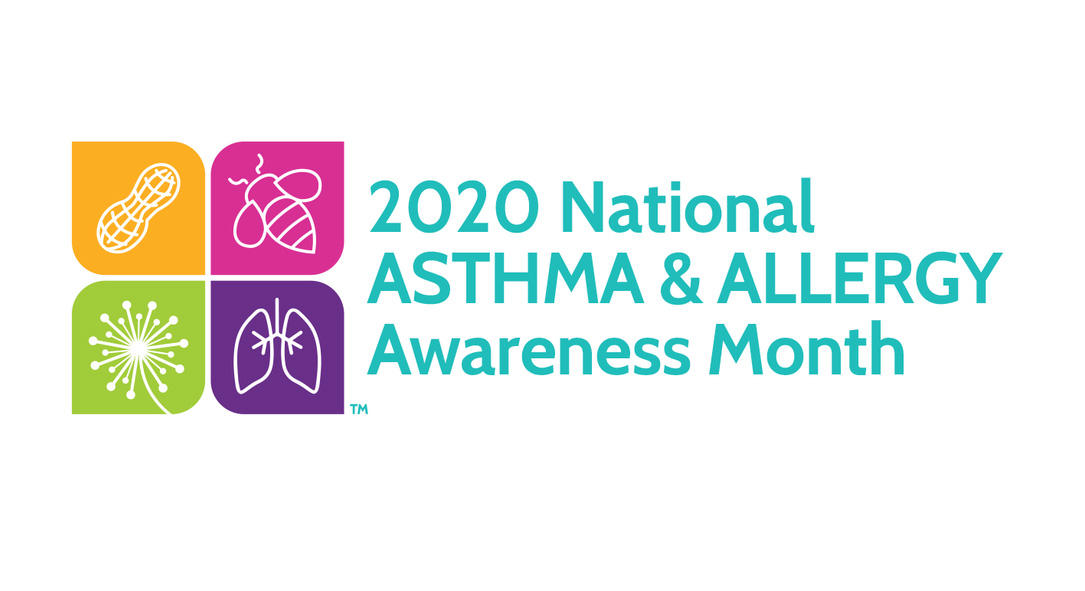In 1984, the Asthma and Allergy Foundation of America (AAFA) declared May to be “National Asthma and Allergy Awareness Month.” Because May is the peak season for allergies and asthma, it’s the perfect month to educate others on the condition that affects more than 60 million Americans.
Symptoms
Asthma is a condition in which a person’s airways become inflamed, swollen, and narrow, causing them to produce extra mucus. This reaction blocks their airways and makes it difficult to breathe properly.
Common symptoms of asthma can include:
- Coughing (sometimes worse at night)
- Wheezing
- Shortness of breath
- Fast breathing
- Chest tightness, pain, or pressure
If the severity of your symptoms increases or worsens, it can cause an asthma attack. Asthma attacks can come on suddenly or sneak up slowly, with symptoms becoming mildly or severely worse. Severe asthma attacks need medical attention as soon as possible.
Click here to read about asthma attack warning signs, and here to create an asthma action plan!
Triggers
Asthma and allergies often go hand-in-hand, and there are several types of asthma, including allergic asthma, which is triggered by allergens in the air like mold or pollen. When you encounter an allergy trigger, your body may have reactions like swelling, sneezing, and runny nose, in addition to asthma symptoms.
Common asthma triggers include:
- Tobacco smoke
- Smoke from burning wood or grass
- Dust mites
- Outdoor air pollution
- Pets
- Mold
Interestingly enough, even cockroaches and their droppings can also be a trigger for asthma attacks. Triggers can vary from person to person, so it’s best to learn your triggers and try to avoid them—especially right now.
Because COVID-19 affects the respiratory system, it shares many of the same signs of asthma. That’s why it’s crucial that you identify what your triggers are, so if you start experiencing those symptoms, you can conclude if they were brought on by allergies or if it’s possible symptoms of the coronavirus.
To learn more about the difference between COVID-19 symptoms and cold, flu, and allergies, check out the AAFA’s chart here.
Treatment
If you or your child suffer from asthma, is it under control? You can tell by asking yourself, do you or your child:
- Miss work or school because of asthma?
- Sometimes need to go to an urgent care facility or to the emergency room because of asthma?
- Take your “quick-relief inhaler” more than two times a week?
- Awaken at night with asthma more than two times a month?
- Refill your “quick-relief inhaler” more than two times a year?
If you answered “yes” to any of the questions above, the asthma is not under control, and you should contact your healthcare provider about treatment.
If you or a loved one experience an allergic reaction or asthma attack, come see us at 508 S Highway 78 in Wylie, Texas. Our team of highly-trained physicians are equipped to treat any type of medical emergency, and we’re here for you!
For more information, resources, or helpful tips, visit the Asthma and Allergy Foundation of America website. And share this article to help spread the word for National Asthma and Allergy Awareness Month!
Disclaimer: As a service to our readers, Wylie ER and Nutex Health state no content on this site, regardless of date, should ever be used as a substitute for direct medical advice from your doctor or other qualified clinicians.
Nutex Health, Inc supports you and your family’s health. You can depend on Wylie ER or any of our concierge-level medical facilities to deliver the emergency care you deserve, 24 hours a day, 365 days a year.






Comments are closed